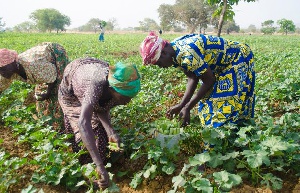A Rocha Ghana and partners have handed over a range of green enterprise processing facilities and equipment to four Community Resource Management Areas (CREMAs) around Mole National Park in the Savanna Region of Ghana.
The interventions are key to enhancing the livelihood and the living standards of women and youth groups living in areas close to the National Park— which is one of Ghana’s premier protected area.
The handing over of the facilities and equipment was part of a bigger vision to support communities to harness the natural resources in their landscape, through the development of green enterprises to provide a competitive long-term stream of income for community people not to compromise the integrity of the environment to support future generations.
The handing over ceremony was held at the Murugu Community in the West Gonja Municipality of the Savanna Region.
The facilities awarded included: a full cycle circular organic shea butter processing factory with improved high-yield equipment with the capacity to directly employ 200 women, produce 1000 kg of organic shea butter in a day and deploy waste recycling facilities in the process to reduce the use of fuel wood, and heating systems to reduce the exposure of women to smoke from the boiling and roasting processes.
In addition, two organic cassava processing facilities had been established in Bawena and Murugu Communities to produce organic Cassava flour to serve local and international market.
Currently over 200 farmers from more than five communities close to Mole have registered to be part of this value chain.
To complement the facilities and support the shea and cassava value chains, the construction of 11 community satellite organic warehouses had been facilitated and expected to serve eight women cooperatives, with over 600 women and a total storage capacity of 400 MT.
Other equipments are provided to facilitate and improve transport of products from farm to the warehouses and the processing centre and also improve processing include;12 motorcycles, 130 tarpaulins for drying, and eight honey extractors to boost honey production in the diverse woodland habitats of Mole National Park.
Delivering a welcome address at the ceremony, National Director of A Rocha Ghana, Dr Seth Appiah-Kubi noted that the CREMAs still needed support to address and regulate illegal activities such as indiscriminate tree felling for charcoal production, and rosewood harvesting.
He bemoaned the current destruction of shea trees, which was the foundation on which shea-based enterprises that supported thousands of women in the northern parts of Ghana depended on.
Dr. Appiah-Kubi called for the legislative action to pass into law the Wildlife Resource Management Bill which has been in and out of Parliament for more 10 years.
This Act he stressed would empower Communities to participate and also benefit from managing natural resources directly and address illegal activities like logging and charcoal which were getting out of hand.
The French Ambassador to Ghana, Sophie Anne AVE, was excited for the women, and happy that AFD funding had yielded such wonderful results for women groups and associations.
She asked the beneficiaries to take full advantage of the interventions and improve wellbeing.
Ron Striker, the Dutch Ambassador of the Royal Netherlands Embassy to Ghana, who was also happy to visit Mole and Murugu was emphatic about the need for the community and development partners to focus on nature, environment and climate change as they were critical issues of the current generation that needed urgent attention by local and national authorities.
Also present at the event were: the Member of Parliament for Damongo Constituency, Mr Samuel Abu Jinapor and Minister-Designate for Lands and Natural Resources; the Regional Minister-Designate for Savanna Region, and Traditional Authorities from the Gonja Traditional Council.
The Occasion also witnessed the signing of a Conservation Agreement between the CREMAs, Savanna Fruits Company and A Rocha Ghana as part of committing to long-term sustainability of the partnerships and working towards landscape sustainability.
The CREMAs benefitting from these interventions included; Murugu-Mognori, Yazori-Kumbo, Bawena-Kpulumbu and Grubagu-Wawato CREMA all of which were located within the eastern boundary of Mole National Park.
The four CREMAs subsequently committed to sustainably manage their natural resources in a manner that ensured that the environment was protected for sustainable farming and at the same time protected to support biodiversity to provide ecosystem system services crucial to support community wellbeing and contributing to the Sustainable Development Goals and building a resilient community.
Funding for the enterprises were made possible by the French Development Agency (AFD), the Global Shea Alliance (GSA) USAID, Dutch Ministry of Foreign Affairs, African Tiger Holdings Limited (ATHL), Noe, Agro Eco and the Netherlands Committee of the International Union for Conservation of Nature.
Direct Private Sector Support for the development of the enterprises came from Savannah Fruits Company (SFC), Evolution of Smooth (EOS), and PhytoDess.
The CREMAs were charged with the responsibility of demonstrating that public-community-private partnerships for channeling community-based financing to support green enterprises that could yield dividends for protected areas in Ghana and therefore needed attention and scaling up.
The management of A Rocha Ghana also called for partnerships to transition other unsustainable value chains like charcoal production into green and restorative enterprises that could support livelihoods and help to secure biodiversity and restore degraded landscapes in the region.
Regional News of Wednesday, 10 February 2021
Source: GNA

















